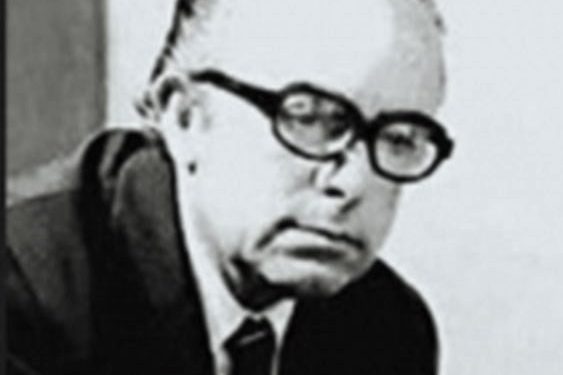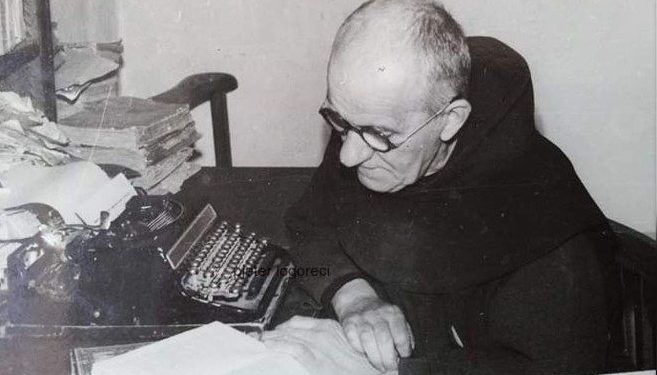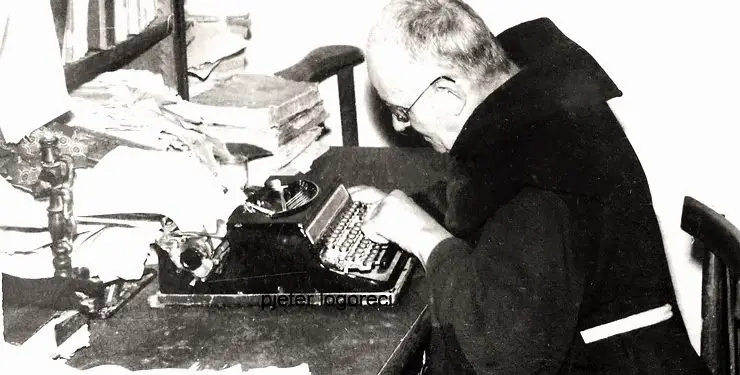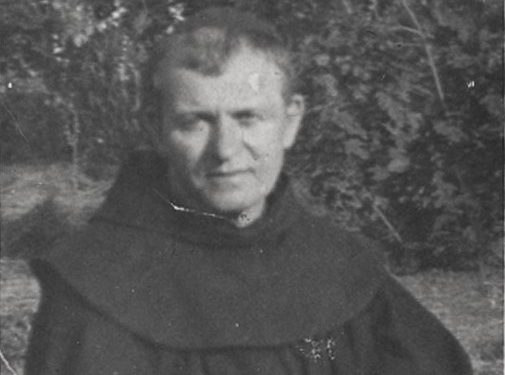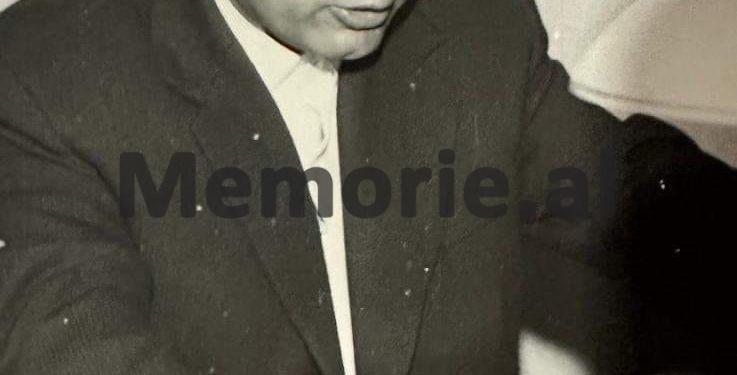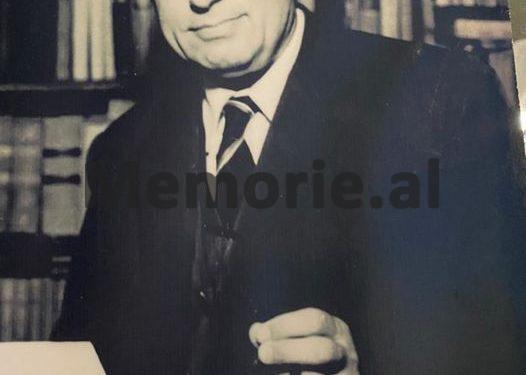By SHPENDI TOPOLLAJ
-About the book “EPISTULAR”… 1951–1964, Volume I –
Memorie.al / A short time ago, the 645-page book “EPISTULAR” by Prof. Jup Kastrati and Father Justin Rrota, during the years 1951 – 1964, came out of print. They are letters exchanged between two luminaries of the science of linguistics, who, fortunately, although they were residents of the same city, Shkodra, rarely met. I say this, because if they met even every day in cafes, we would not have this precious treasure in our hands, because it was not for nothing that the old Latins said “Verba volant, scripta manent”. I want to believe that in all of our history, there is no similar case where in a private correspondence, with letters sent by courier, so much knowledge, professional and pedagogical responsibility and so much friendship, sincerity, simplicity, gratitude and patriotism are included.
I spent my childhood, within the span of this period, in that city, where even today, I am haunted by the amazing image of the beauties of nature, the alleys where the privet hung from the stone walls and the houses with those courtyards with roses, as well as the kindness, generosity and culture of its inhabitants. But what has given Shkodra a special splendor remains the versatile intellectual work of many men and women, not a few of whom, not only had studied mainly in Western countries, but also brought new experiences from them where they worked and created.
And here are two of them, with differences and similarities: Father Justin, born around 1889, a Franciscan priest, that is, a servant of God, ill for a long time, locked in a cell there at Arra e Madhe, almost without any contact with living life, and Jup Kastrati, some thirty years younger, once his student, Muslim, but who believes that God on earth is man, a committed activist who moves both in Tirana and in other cities of the country, but both of whom were educated in foreign schools, have connections with teaching and especially with everything that language includes, from phonetics, syntax, morphology, lexicology, orthography, etymology to Albanology, etc., as well as a thirst for constantly reading artistic literature by local and foreign authors, in Albanian and other languages.
The ancient Romans had a saying; “Equals unite”, but no matter how they called each other; “Master” and “Professor”, the latter still reminds Father Justin, the words that Maxim Gorky addressed to Kalluzhny who encouraged him to publish “Makar Chudra”: “You were the first to look at me with a kind, sweet and unforgettable eye…! You are the first to encourage me to look at myself seriously”.
Both are authors of important works and both seek and make contact and exchange opinions with Albanologists from other countries, both consult, approve, suggest and advise each other, both borrow literature that is difficult to find. Also, both refer to the expressions of the benefactor of the emperor Augustus, Horace (Quintus Horatius Flaccus 65 – 8 BC), with friends.
And it is painful to see those scientists suffering for a precise typewriter, a typewriter ribbon, or a little paper and an envelope. Not to mention the poverty of the ascetic Father Justin, who does not even ask for royalties, but, if they are going to give any reward for his books or research articles, he wants those few ALL for his sister, who has no income, since their son has also been taken to the army.
This old Ovid, as he calls himself, almost paralyzed, with one blind eye and who also advises Jupi; “Everything in moderation”, to preserve his health, barely gets out of bed and works tirelessly on the keys with one finger, only to say to generations, post mortem, that; “I have never been without work”, despite the fact that he cannot afford to pay the typist and despite the fact that his work is that of a tireless academic.
He does not give up even though he tells his friend that “Those old poets used to tell stories about the water bird, the swan (cygnus), as if, before this life came to an end, he would sing to it as much as he could, as if he wanted, through those longing melodies, to say goodbye to this land forever.” This is why Prof. Kastrati also places him alongside the most distinguished, most honest and patriotic people that Shkodra has produced and, as early as January 1954, describes him as: “Teacher of Albanian for more than twenty-five years, a profound admirer of it, a tireless worker of our classical writers, a transcriber of our oldest monument ‘Gjon Buzuku’, a scholar of our old authors: Matranga, Budi, Bardhi, Bogdani, etc.;
A keen observer of the most delicate problems that our language presents, compiler of our scientific ‘Syntax’, of the ‘History of the Albanian Alphabet’, of the ‘Analysis of the Cases of the Noun and Their Historical Development’; compiler of many other works on ‘Albanian Literature’, ‘On Our Grammar’, of educational books such as ‘About You’, etc. and despite being paralyzed for years, he still continues to work tirelessly for nearly ten hours a day on cleaning our vocabulary from foreign words, on the morphology and grammatical structure of the Albanian language, on orthography, etc. A man of will and sacrifice, he is a figure that commands respect and inspires work.”
And such a titan of work was Jup Kastrati himself, as is evident from everything he did throughout his life. I found him like this when I went to see the late Nasho Jorgaqi: seriously ill in his bedroom, leaning against the head of the bed, and with a notebook and pencil in his hand. Even in that grave condition, he wanted to know from us how the symposium on the novel was going, just as Father Justini once asked him:
“Please, keep me up to date with national literary life, and do not let anything pass me by in silence, regarding literary, linguistic, etc. matters that deserve to be known.” Suffice it to mention that Father Justini, upon reading the announcement in 1929 that the oldest Albanian book (1555) was found in the archives of Rome, had rushed there and with his own expenses and effort, after many vicissitudes, brought the famous “Meshari” of Gjon Buzuku to Albania.
This alone would be enough to erect a monument to that man, about whom Prof. Çabej said: “The wheel is a scientist”. But he does not stop there, he writes insistently about this great figure of ours and declares that; “I will work for my Buzuk; and I am happy, that I am found enlightening the preferred Classic”! And how could he not be interested in the origins of this language, about which Pandeli Llazar and Vasil Marku had previously said that; “The roots of ancient Greek are Homeric, and the Homeric language is today’s Albanian”.
For his part, Prof. Jupi not only supplied him with the books he was looking for and for which he had to make heroic efforts to find, but also informed him about everything that was happening in our academic world, in conferences and congresses dedicated to the language, about the discussions held there, the polemics developed, the speeches or articles of foreign Albanologists, periodicals, magazines from other countries that came to us with restrictions, etc. etc.
Once the Professor delayed his response, and Father Justini wrote to him: “On the foreign Albanological movement, you have left me deaf, now I will know”. Likewise for the delay in literary news. But Prof. Jup Kastrati is terribly busy; He is a teacher at the gymnasium and the Institute, where he teaches the tedious subjects “History of the Albanian Language” and “Historical Grammar”, and then “Introduction to Linguistics” and “Contemporary Albanian Language”, corrects the assignments of a multitude of pupils and students, attends their exams, defends his scientific title, writes various articles in magazines and newspapers, etc.
He leads various activities, even funeral ceremonies, he often goes to Tirana to the Academy of Sciences, with that miserable traffic, where so much work awaits him, he stops at the National Library, where he studies the authors he needs, meets and accompanies delegations, is sent abroad for qualifications, goes on scientific expeditions for subdialects or, as he himself claims, in one week, to go to 22 villages and cities, he travels a full 1,300 km.
He also has family obligations: he gets engaged, gets married, gives birth to his first child, the unfortunate Laura, who dies before reaching the age of one, while two others come to light like stars of wisdom. And yet, Professor Jupi, with his immeasurable work, gains a nationwide reputation, he is one of the most respected, both by colleagues and foreign personalities, who either meet him at organized activities, or go to visit him at home, where he welcomes them with that well-known Shkodra generosity, they write to him and consult with him.
The book also appears to us as a homage to them, honorable names, such as; Cimochowcki, Desnickaja, Bariçi, Skoku, Novaku, Malinçev, Rosetti, Nahtigal, La Piana, Lambertz, Mustilli, Tagliavini, Roques, Schiro, Seidel, Tamas, Meyer, Camarda and many others, about whom Father Justin says to the Professor: “… I rejoice, I take note: that there are still people in the world who are interested in our language”.
In their numerous letters, 299 of them, many of the prominent Albanologists, whose work has brought honor to our Homeland over the years, such as; Nopsca, Laura, Zoltan, Milan, Elekas, Jireçek, Gyula, Sufflay, are mentioned. And how much respect these two linguists have for the extraordinary work of their colleagues, such as; Çabej, Xhuvani, Domi, Kostallari, Shuteriqi, Pollo, Riza, Kamsi, Osmani and friends. One is amazed by their patience to obtain complete and reliable data, whether from different authors, such as Hortense Zambaure, an eyewitness, or from ordinary people who lived through those events, for monographic writings, such as the one on the assassination of Hasan Riza Pasha.
They speak in their letters about the literary and patriotic values of the Renaissance people, such as; Mjeda, Shiroka, Gurakuqi, etc. and compare the literary contributions of Noli and Konica, Fishta, Migjen, Viktor Volaj. They also sift through the titles of the books and give each other permission to take whatever they want from what they have written themselves.
Even for an epigram, they consult with their friend, such as that of Father Justin, for his book, “Last Days”: “To my dear city and fellow citizens / of vital, great, and noble Shkodra / these bloody pages / which / in short intend to weave / the events of a siege / among the longest and most tragic / that the history of peoples knows / with reverence and longing / the Author”.
And he writes this book about what the city’s inhabitants experienced, for seven consecutive months; “to leave this terrible memory to my grandchildren, so that they do not have to remember the war with a fairy tale in their mouths”. Both letter-exchangers in their daily lives also worry about a single word, such as borgjes, hajde, vjedmis, mashalla, or the genesis of people’s names, cities Rubik, Elbasan, Skampa or, where is the birthplace of Buzuku…etc.
They show their disapproval of the deformations that are made to the language, using foreign words everywhere, for which they also compile a Dictionary. But, while Father Justin makes some remarks about the exponent of Gegnishtesh, Jupin, the latter, on his part, seeing more closely how academic thought about the language was progressing, announces to the old man that; “we are in a phase of normalization and stabilization of the Albanian literary language”.
When he sees that it has been established, Father Justin quite naturally asks the Professor; “…we saw it, please, beg forgiveness for my mistake”! (Mr. Domi). The Master begs the Professor, not to learn if his brother is still alive, there in Vienna, and the latter begs him to tell him, if he can, to find the lecture given by Ndre Mjeda, at the XIIIth International Congress of Orientalists, in Hamburg, in the year 1902.
And the Master continues with his requests: “Ask a Professor, who is not gibberish, but a pure gibberish, are these from the people; ‘The passerby, the passable’ Fj. I have it for the purpose of changing the thematic diphthong: once with – ua, then with ue… in the same case”. They also extend their interest to the Arbëresh dialect, where they discuss; “…as regards the linguistic phase between the Tuscan of Albania and the Tuscan of the Arbëresh”. They understand each other very well, and show the same emotions, as for them it is a special joy that; “…soon the Albanian dialects will be nourished in their own language, with the beauties of their distinctive dialects”.
Prof. Jupi, gives the happy news of the creation of our state University to the Master, but even at that time with risks, informs him and sends him through the courier, Paulini, the book “Americana”, where he tells him that he will find the origins of the literature of that country, starting from Irving, Poe, Hawthorne, Melville, Twain, Harte, Bierce, the verists, naturalists and realists Crane, O`Henry, Norris, London, Dreiser and adds: “There you will also find the peaks of literature with Sherwood Andersen and the laureate of the ‘Nobel’ prize: Eugen O`Neill as well as the contemporaries William Faulkner, Ernest Hemingway, John Steinbeck, Erskine Caldwell, William Sarayan etc. I believe that you will like them”.
In their letters, especially Father Justin, amidst the pain and poverty, finds room to use a pleasant humor. Here is how he expresses it to the Professor: “The brochures… leave me for a few weeks…! I won’t tell you; no matter how much this table is made of papers and notebooks, it’s done, as long as it’s quiet with the whole cart”. Or, it reminds you that; you know your bicycle, why don’t you suddenly get stolen one day”. That’s why now, not jokingly, I remember that these great Albanians, erudite and polyglot priests, like Father Justin Rrota, were shot and imprisoned by the dictatorial regime in our country, bringing extraordinary damage to the people and their culture.
And to close, I think that this book brought as a gift by the daughters of the unforgettable, Professor Jup Kastrati, will remain a monument, both for those two rare men, and as a reference point, where every intellectual should learn and be inspired, how to work with high integrity, for the Homeland. A reference point, especially today, when the homeland more than ever, loves everyone’s contribution. A point of reference to remind us of the golden words of Paul Elyar: “It is worth nothing to love, if the mourning of your country does not touch your heart.” Memorie.al




